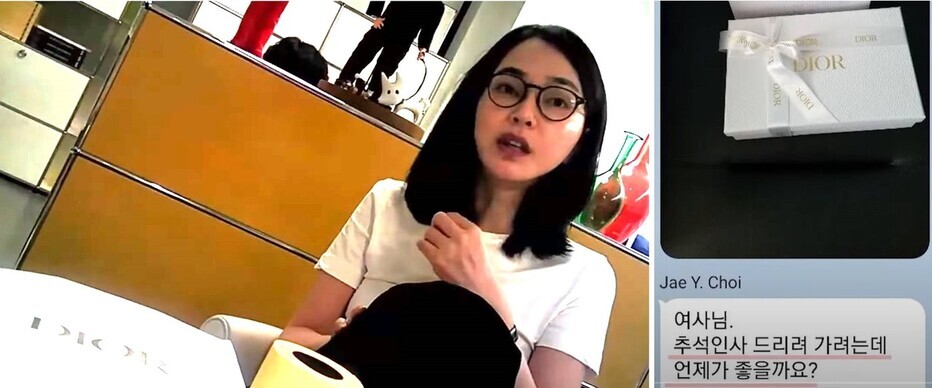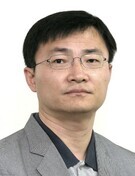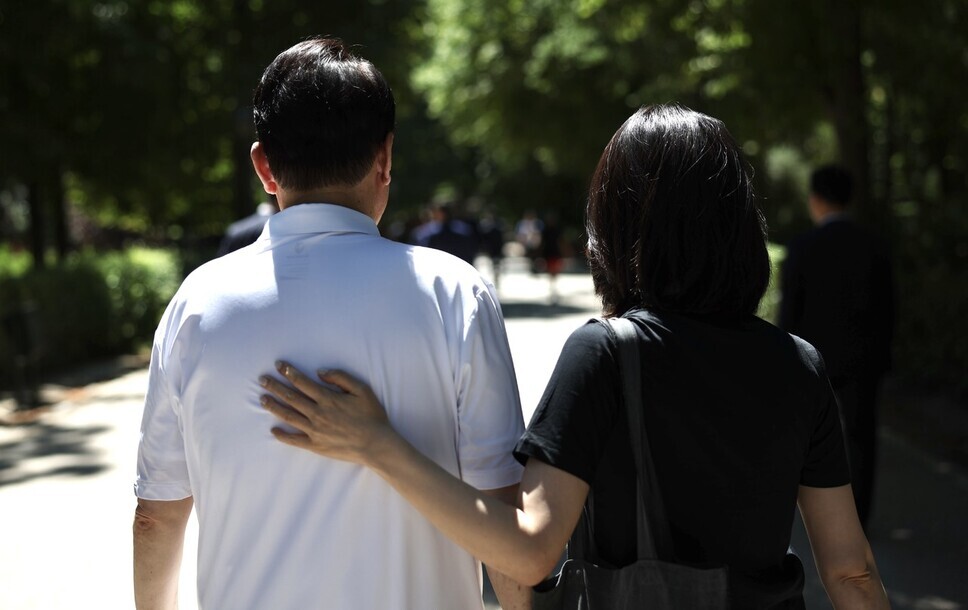hankyoreh
Links to other country sites 다른 나라 사이트 링크
[Column] Kim Keon-hee: First lady or president?


Did the wife of the president violate the law when she accepted a luxury handbag? It’s been 10 days since the video went viral, yet people continue to argue over something that’s as simple as elementary arithmetic. It’s farcical.
“Yes, it’s a violation of the Kim Young-ran Act.” This is the response I got from those who served with South Korean President Yoon Suk-yeol during his days as a prosecutor in the special investigations department. It’s also the response that six of his junior and senior colleagues provided when asked about the first lady receiving such an improper gift.
“It’s as clear as day.” Even a close friend of the first lady gave a clear-cut response.
Kim Keon-hee received a Dior handbag worth 3 million won (US$2,295) from a pastor named Choi Jae-young on Sept. 13, 2022, only months after husband was inaugurated. The Kim Young-ran Act, or Improper Solicitation and Graft Act, prohibits the spouse of a public official from receiving gifts that exceed 1 million won (US$765) in value in a single sitting or gifts that exceed 3 million won in value in the period of one year. The act prescribes a punishment of up to three years in prison and up to 30 million won in fines.
Even worse is that the first lady agreed to meet with Choi after he announced his intentions by saying he’d “come prepared with a handbag.” Kim’s attempt to justify the gift by claiming she received it “in a moment of bewilderment” is feeble. She didn’t reject it, and she didn’t return it.
The issue doesn’t stop with Kim, however.
When a public official learns that their spouse has accepted a prohibited gift or good, it’s incumbent upon the official to immediately report the incident in writing and return the item or persuade their spouse to do so.
In fact, the law states that the official must carry out that duty “without delay.” Failure to do so makes the official subject to the same punishment as their spouse.
In the case of Kim, that duty would have fallen upon her husband, President Yoon Suk-yeol. That’s why the questions of when Yoon learned about his wife’s receipt of the bag and whether he carried out his legal duty are so important.
Even if he hadn’t been aware of the bag before, he can’t claim ignorance following the release of the video. Therefore, it’s essential to confirm what Yoon’s response was.
But thus far, Yoon’s presidential office has refused to respond or even comment on the affair.
Korea’s Anti-Corruption and Civil Rights Commission, the agency responsible for matters related to the anti-graft act, said it “couldn’t confirm” whether a report had been made about Kim. Justice Minister Han Dong-hoon, who has been called “the best prosecutor in the country,” pleaded ignorance about the gift of the bag even after the video had gone viral.
It seems doubtful things would have gone like this if the bag had been given not to Kim but to the wife of another public official in the presidential office.
First, there would have been an audit by the office of the secretary to the president for civil service discipline. Then Korea’s Anti-Corruption and Civil Rights Commission might have launched an investigation of its own.
Considering that the Yoon administration finds ample room for interpretation in each “etc.” in the country’s enforcement degrees, it could certainly have taken those steps, given the phrase about “fact-finding investigation and collection, management, analysis, etc. of documentation and evidence” for carrying out investigations in the Kim Young-ran Act. Nothing would have stopped the police and prosecutors from carrying out their own investigation.
But none of that happened. Kim seems to enjoy the president’s immunity from criminal indictments while in office.
At the same time, there have been some ludicrous attempts to muddy the waters.
Perhaps the most prominent of these is an appeal to the legal doctrine of “fruit of the poisonous tree.” Under this argument, Kim’s receipt of the bag (the fruit) was the result of a trap set by the “Voice of Seoul” news channel (the poisonous tree), thus supposedly clearing her of any responsibility.
Does that same logic apply to the audio file secretly recorded by a famous cartoonist that serves as the key evidence in the trial of a special-ed teacher accused of abusing his son? Does that also count as fruit of the poisonous tree?
The decisive evidence in prosecuting Choi Soon-sil, confidante of former president Park Geun-hye, was found on Choi’s tablet computer — which was taken without permission by a TV news journalist and then put on the air. Was that too fruit of the poisonous tree?
The fruit of the poisonous tree is a principle in criminal law that forbids law enforcement agencies, including the police and prosecutors, from collecting evidence through illegal means. That has nothing to do with the ethics of journalistic reporting. And yet, frantic efforts are underway to conflate the two with the goal of distracting the public.

The president and first lady are powerful right now. Kim’s behavior may be swept under the rug, for now.
But it’s not just going to go away. The statute of limitations for taking the bag is five years, which means that an investigation could be opened and charges filed as late as September 2027, four months after Yoon completes his term in office. For the prosecutors to deliberately disregard the issue that whole time would be dereliction of duty.
“Everyone who has brought up the issue of the first lady, including former senior prosecutor [name reacted], has been cut off without exception. Who dares to bell the cat?”
Yoon’s former colleagues have continued to voice their concerns.
“Until the president is ready to risk divorce, he won’t be able to deal with the first lady issue.”
“Do you really think this is the first time? The bag is bad enough, but even more shocking is the rumor that Kim listened in on a phone call when someone was asking for a position on the Financial Services Commission.”
“And what was the first lady thinking when she said she’s thinking about getting involved in inter-Korean affairs?”
One of the essays in “Han Feizi,” the classic work of Chinese political philosophy (that Yoon is no doubt aware of), enumerates eight dangers the ruler must be on guard against. The first one mentioned in the essay is “bedfellows” — in other words, your spouse.
It’s shocking, and spooky, that a two-millennia-old observation still rings so true today.
Please direct questions or comments to [english@hani.co.kr]

Editorial・opinion
![[Column] When ‘fairness’ means hate and violence [Column] When ‘fairness’ means hate and violence](https://flexible.img.hani.co.kr/flexible/normal/500/300/imgdb/original/2024/0516/7417158465908824.jpg) [Column] When ‘fairness’ means hate and violence
[Column] When ‘fairness’ means hate and violence![[Editorial] Yoon must stop abusing authority to shield himself from investigation [Editorial] Yoon must stop abusing authority to shield himself from investigation](https://flexible.img.hani.co.kr/flexible/normal/500/300/imgdb/original/2024/0516/4417158464854198.jpg) [Editorial] Yoon must stop abusing authority to shield himself from investigation
[Editorial] Yoon must stop abusing authority to shield himself from investigation- [Column] US troop withdrawal from Korea could be the Acheson Line all over
- [Column] How to win back readers who’ve turned to YouTube for news
- [Column] Welcome to the president’s pity party
- [Editorial] Korea must respond firmly to Japan’s attempt to usurp Line
- [Editorial] Transfers of prosecutors investigating Korea’s first lady send chilling message
- [Column] Will Seoul’s ties with Moscow really recover on their own?
- [Column] Samsung’s ‘lost decade’ and Lee Jae-yong’s mismatched chopsticks
- [Correspondent’s column] The real reason the US is worried about Chinese ‘overcapacity’
Most viewed articles
- 1Could Korea’s Naver lose control of Line to Japan?
- 2[Column] Welcome to the president’s pity party
- 3[Column] US troop withdrawal from Korea could be the Acheson Line all over
- 4Naver’s union calls for action from government over possible Japanese buyout of Line
- 5[Editorial] Korea must respond firmly to Japan’s attempt to usurp Line
- 6Korea cedes No. 1 spot in overall shipbuilding competitiveness to China
- 7[Editorial] Yoon must stop abusing authority to shield himself from investigation
- 8[Column] When ‘fairness’ means hate and violence
- 9Korean opposition decries Line affair as price of Yoon’s ‘degrading’ diplomacy toward Japan
- 10Second suspect nabbed for gruesome murder of Korean in Thailand, 1 remains at large